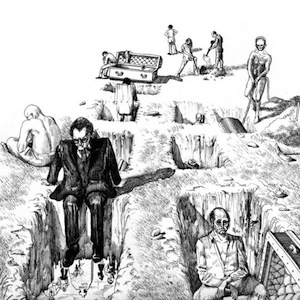Laurel Halo Chance of Rain
Laurel Halo‘s remarkable debut full-length for Hyperdub, Quarantine, proved divisive upon its release last year, […]

Laurel Halo‘s remarkable debut full-length for Hyperdub, Quarantine, proved divisive upon its release last year, largely due to the album’s stark, abrasive treatment of the Brooklyn resident’s vocals. Since the release of that record though, Halo has shied away from using her voice, and her most recent EP, Behind the Green Door, eschewed the use of vocals entirely. Her full-length follow-up to Quarantine continues this trend, and finds the producer—on pace with her recent live sets—embracing a wonky sort of techno that falls somewhere between the sonic range she has been exploring under the King Felix moniker, and the dense, instrumental abstraction that has come to be expected from a Laurel Halo release.
Like the rest of Halo’s back catalog, there is a palpable sense of unease to Chance of Rain‘s off-kilter sonics. There’s very little to hold onto in the album, as beats come in and out of focus and congeal with intricate synthesizer patterns. This disorienting effect is not to suggest that the LP is lacking in melody; on the contrary, there’s plenty of melody on the album, but its use is rarely conventional and frequently beguiling. Take a track like album highlight “Chance of Rain,” which begins as an ambient techno workout reminiscent of early Warp recordings before Halo upends the tune’s structure with the introduction of a filmic but jarringly off-key keyboard line. Underneath all of this, the beat momentarily disappears before reappearing in a subtly altered form, only to decay and then re-emerge again in yet another guise. This restlessness and constant shifting of gears within a track’s parameters is a recurring feature of Chance of Rain, and serves to subvert Halo’s alignment with the techno influences she flirts with to such compelling effect. Elsewhere on the record, certain tracks channel the sparser, more bass-inclined recesses of UK club music, such as “Oneiroi,” which recalls the bare-boned techno of Night Slugs’ Club Constructions 12″ series, but is scuffed beyond all dancefloor utility. Similarly, tunes like “Serendip” and “Ainnome” allude to the gloss of much contemporary club music, but the steady momentum this implies is at every step undermined by the tunes’ stuttering rhythms and tripped-out synth layers. One of the album’s most memorable moments is “Thrax,” a tune which deploys an ear-worming melody that seems to push up against the track’s agitated, brittle beats. The track is typical of Halo’s recent approach; it’s restless, intricate, and relentlessly exploratory.
Chance of Rain will likely prove less controversial than Quarantine, but by no means is it a less challenging record. While Quarantine‘s unadorned vocals alluded to a post-human sense of alienation, Chance of Rain sounds positively inhuman. It is cold and in many ways inhospitable music, but it’s music that’s bursting with ideas and a refreshing willingness to embrace complexity at a time when so much dance music is going back to basics.

